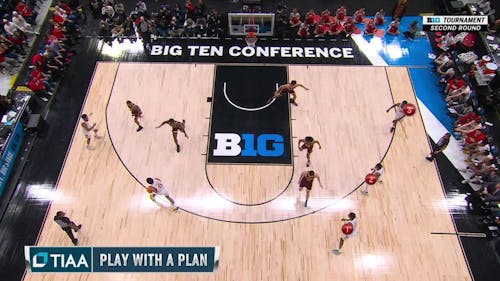Is Big Ten cannibalizing itself?

The start of March means the start of conference basketball tournaments for the power six conferences. With the Big Ten basketball tournament in full swing and the upcoming NCAA Tournament on everyone’s mind, conference comparisons naturally pop up.
Head coach Steve Pikiell has maintained that the Big Ten is the best basketball conference in the U.S.
"It's the best league in the country," Pikiell said. "The challenges are immense everywhere you turn."
Despite Pikiell’s praise and the high number of teams the Big Ten sends to the NCAA tournament, Big Ten teams have recently struggled in NCAA tournament play.
In the last two years, only two Big Ten teams have advanced to the Sweet 16, and no Big Ten team has made the final four. Michigan made the Sweet 16 in 2021 and 2022, and Purdue made the Sweet 16 in 2022.
Many people have given a multitude of reasons for the Big Ten’s struggles in the NCAA tournament, with even Maryland’s head coach Kevin Willard giving his thoughts. Willard has blamed the Big Ten’s packed schedule for its lack of NCAA tournament success. Back in December, he compared the Big Ten to the Big East conference, where he used to coach.
"(Big East) really understood and really took care of their basketball teams, " Willard said. “They wanted their teams to be very competitive in the NCAA tournament."
Willard’s criticism of the Big Ten, while scathing, may have some merit.
The Maryland men’s basketball team played seven games in February, and the Rutgers men’s basketball team played eight games in February.
Regular season scheduling is not the only issue, though. The Big Ten Tournament is only 1 of 2 tournaments among the power six conferences that go until March 12.
This gives Big Ten teams one less day to recover for the NCAA tournament, which starts on March 14 for some teams. While initially, a day might not sound like much, with teams fatigued and banged up from playing so many games, 24 hours can help immensely.
If the conference wants to have better performances on the biggest stage, moving the tournament a day back and having the tournament finish on March 11 could help a lot.
Another potential reason the Big Ten has struggled in the NCAA Tournament is the style of play in Big Ten basketball, which is known for low-scoring, defensive and highly physical games.
In the first round of the NCAA Tournament, though, Big Ten teams don't face off against other Big Ten teams, and Big Ten teams rarely face off in the second round. Other conference teams that tend to play faster-paced and more offense-oriented basketball have given the Big Ten issues in the past.
The intense physical style of the Big Ten, while it may make the conference very competitive and fun to watch, also wears teams down. By the time mid-March rolls around, Big Ten teams are exhausted from playing 20 other physical Big Ten teams. That is not to say all conferences are physical, and most conferences play 20 in-conference games, but the physicality of Big Ten basketball is a step above most.
The final reason Big Ten teams have struggled in the NCAA Tournament is luck. The NCAA Tournament is a single-elimination tournament, and like most single-elimination tournaments, a fair amount of luck is involved.
All it may take for a team to pull off a monumental upset is for the team to have a really good day. That may be the appeal of the NCAA tournament, but recently, these odds have not fared well for Big Ten teams.
If the Big Ten suffers more disappointing results in the NCAA Tournament this year, the conference may want to look at fixing scheduling and pushing back the Big Ten Tournament by a day. That said, with a good performance from the Big Ten in this year’s NCAA tournament, this whole debate may become moot.
For more updates on the Rutgers basketball team, follow @TargumSports on Twitter.



